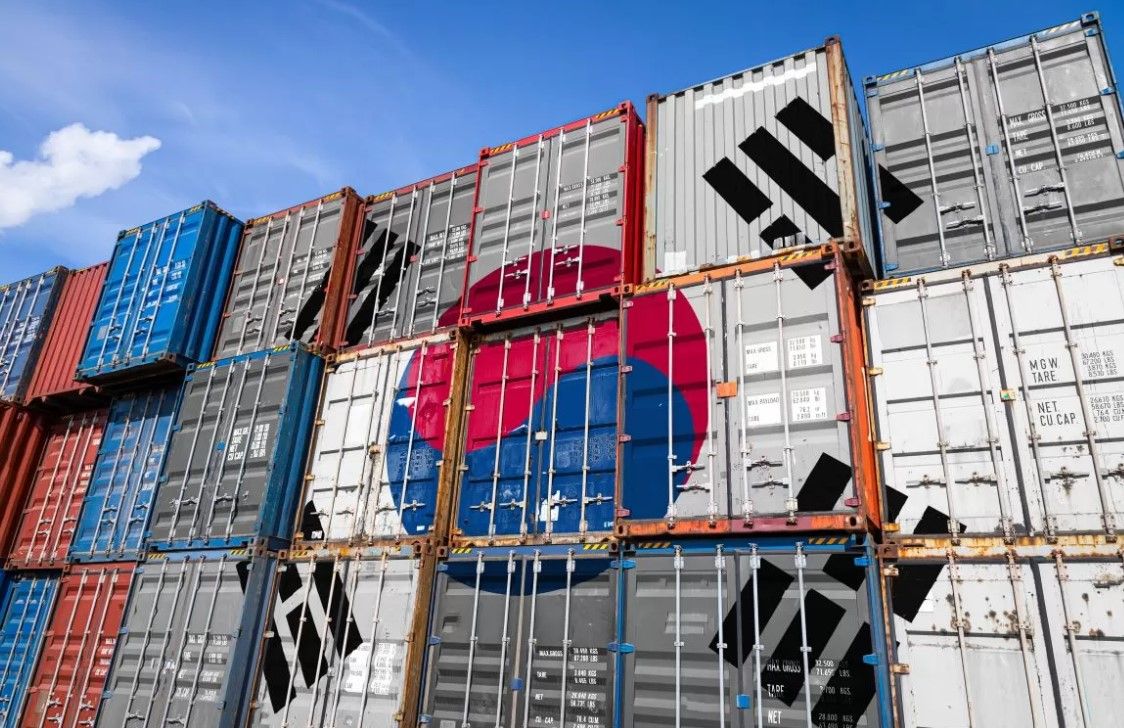
South Korea has emerged as one of the significant economies in the world. The past decade has been in favour of the country when it comes to a rise in economic status among other countries and massive GDPs in the world. The country’s growth is highly based on trade (imports and exports). It is getting very focused on manufacturing in its own industries, making it one of the largest producers of electronics, cars, and real estate.
In this blog, we will be discussing the top products manufactured in Korean industries and exported worldwide.
South Korean trade (export) value has been increasing significantly every year:
|
Year |
Export Value (USD Billion) |
|
2015 |
$526.80 |
|
2016 |
$495.40 |
|
2017 |
$573.70 |
|
2018 |
$605.20 |
|
2019 |
$542.20 |
|
2020 |
$512.50 |
|
2021 |
$644.40 |
|
2022 |
$683.60 |
|
2023 |
$631.30 |
|
2024 |
$683.80 |
If we look closely at the export values given in the table, we can understand that the gradual growth in production and trending products out of the country are contributing greatly to the South Korean economy. According to the reports, in March 2025, South Korea exported $58.2 billion.
We have data for March 2025 related to South Korea’s export growth. It showed impressive year-on-year gains influenced by strong demand from big Asian and Western markets. The data shows exports to the United States increased by $1.24 billion, marking a 12.5% rise. This reflects the growing trade in advanced technology and automobiles.
The exports to China peaked by $1.07 billion, a clear 39% hike. It is likely driven by semiconductors and industrial components.
Meanwhile, exports to Hong Kong saw the highest growth rate, climbing by $812 million or 42.9%, suggesting a dire demand in consumer electronics and re-exports. These figures highlight South Korea’s expanding trade ties and global supply chain relevance.
We have curated a list of Korean industrial products for export worldwide:
South Korea is one of the top automobile exporters globally, known for innovative engineering and competitive pricing. Hyundai and Kia, two of the nation’s leading automakers, dominate the export scene with fuel-efficient, tech-integrated models. The revenue in the car market is projected to reach US$41.5 billion in 2025.
These brands are especially popular in the U.S., Europe, and emerging markets like India and Brazil. Korea’s auto sector contributes significantly to the national economy. It is contributed by the consistent demand for electric vehicles and SUVs. Korean manufacturers are also investing in autonomous technology. They are making their vehicles more appealing to global buyers looking for smart and sustainable transportation solutions.
Semiconductors are South Korea’s highest-grossing export product. Companies like Samsung Electronics and SK Hynix are global giants in memory chips. They are powering devices from smartphones to supercomputers. These high-performance components are in massive demand across the U.S., China, Japan, and European tech industries.
Semiconductors are important for AI integration and consumer electronics. It can help in maintaining Korea’s role in global technology advancements. Government support and constant R&D keep Korea ahead in innovation, making its chips a very important component in a world increasingly driven by automation and smart devices.
South Korea’s chemical and petrochemical industries are highly advanced. They are contributing significantly to export revenue. LG Chem and Lotte Chemical are the leading producers. The companies are supplying high-grade polymers, resins, and industrial solvents. These materials are used worldwide in manufacturing, textiles, automotive, and electronics particularly in China, Southeast Asia, and the Middle East.
The country’s well-developed refining infrastructure allows it to process and export large volumes globally. The Korean chemicals are known for their purity and eco-friendly formula reflecting the market for new consumers, especially in the growing demand for biodegradable plastics and specialty materials.
Korean cosmetics, famously referred to as K-beauty, have taken the world by storm. K-beauty is dominated by brands like Amorepacific and LG Household & Health Care, which are leading in skincare innovations. Seerums, essences, BB creams, and other Korean beauty products are exported widely to China, Southeast Asia, the U.S., and Europe.
These products are a combination of natural ingredients and appealing packaging which has made K-beauty a trusted name worldwide. Korea’s beauty sector plays a key role in cultural exports. It has enhanced both economic impact and soft power. Consumer trust in quality and trends makes these products a staple in global beauty markets.
South Korea exports high-quality agricultural goods like ginseng, mushrooms, seaweed, and processed rice snacks worldwide. Korean brands such as Korea Ginseng Corporation have helped put Korean produce on the global map. These goods are highly sought after in China, the U.S., and parts of Europe due to their perceived health benefits and quality control.
Korean agriculture is focused on clean farming and government-backed certifications. These factors make exports reliable. Rising global interest in wellness and functional foods is driving up demand for Korean health foods, herbal drinks, and snack items.
Shipbuilding is a speciality of Korea’s industrial set up. The country has Hyundai Heavy Industries and Daewoo Shipbuilding & Marine Engineering that are leading the charge. South Korea exports high-capacity container ships, carriers, and ship components to countries like Greece, Singapore, and Norway. These products are designed by following international standards and offer high durability and fuel efficiency.
The industry supports thousands of jobs and plays a crucial role in Korea’s heavy manufacturing sector. Korea has shipbuilders who are now using green technologies like ammonia-fueled engines that align with global goals for sustainable shipping and giving them a competitive edge.
Starting a business with Korean products in 2025 is a smart move. With high durability and precise affordability, you can reach the top of the profit by acquiring products through B2B websites and registered Korean manufacturers.
The following are the best B2B websites to find Korean manufacturers for industrial products:
Tradewheel.com is a global B2B website where you can easily connect with verified Korean manufacturers to get goods. The platform is well-organized, making it easy to search for products, compare prices, and send inquiries directly.
Tradewheel.com lists thousands of Korean suppliers in one place, including electronics and industrial tools. It’s especially helpful for people who want to buy in bulk or start importing. You can find product categories, seller details, and shipping options clearly explained. This site is trusted by businesses around the world for its easy access to genuine Korean factories and wholesale exporters.
EC21 is one of Korea’s oldest and most trusted B2B marketplaces. It connects international buyers with Korean manufacturers across many industries, including machinery, chemicals, beauty products, and electronics. As a new business, if you want to import from Korea then you can find good suppliers by using EC21’s detailed product listings and company profiles. Each listing includes product features, price ranges, and contact details.
EC21 also offers trade leads and business matching services. The platform supports global trade by helping small and large companies connect directly with Korean factories and exporters in just a few steps.
TradeKorea is a reliable B2B site run by the Korea International Trade Association (KITA). It focuses only on Korean-made goods and manufacturers, making it the best place for finding trusted suppliers. If you need cosmetics, automotive parts, or industrial tools, the platform offers a wide selection.
Each supplier is verified, while many are certified for quality. You can send quotes, ask questions, and request samples all from the website. TradeKorea helps buyers worldwide feel more confident when doing business with Korean companies as it offers trade support and expert advice along the way.
Alibaba.com is a leading global B2B marketplace where you can filter your search to show only Korean manufacturers. It has millions of products, including electronics, food items, clothing, and machines from Korean suppliers. The platform supports business growth by offering tools like trade assurance, secure payments, and shipping help.
Korean manufacturers listed on Alibaba often provide detailed product descriptions and fast response times. If you’re starting an import business or looking to order in bulk, Alibaba gives you many options to compare prices, check reviews, and find suppliers that match your needs.
Every country has its own strengths that contribute to the success of the economy every year. Korea is highly dependent on exports, and the following are some of the main factors that contribute to the growth in Korean exports every year:
The Korean manufacturing units are not behind in using advanced technology, which is one of the reasons behind quality production.
The country is incorporating convenient yet efficient logistics that play a vital role in transforming products from one place to another at the right time.
Korea has signed trade agreements with several countries such as the USA which has impacted highly on its export and overall trade relations with other countries.
Korean manufacturing and exports are fully backed by their government. It increases opportunities and pushes local people to take chances and start their own businesses.
In this blog, we have thoroughly discussed the top contributory factors behind the economic growth of South Korea and have come to a conclusion that exports are one of them. South Korea is self-sufficient in producing and exporting products like semiconductors, automobiles, cosmetics, and other products that are highly demanded worldwide. It is a growing market which has high scope of growth for newcomers.
